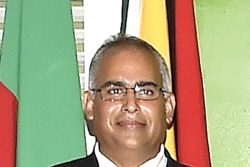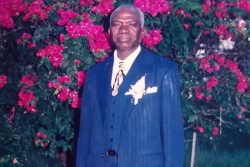The main opposition A Partnership for National Unity+Alliance for Change (APNU+AFC) has filed its second petition challenging the March 2nd polls and is seeking to have the court nullify the outcome and to declare President Irfaan Ali to be illegally holding office.
In fact, through petitioners Monica Thomas and Brennan Nurse APNU+AFC wants the court to specifically order the Chairman of the Guyana Elections Commission (GECOM) to declare its Presidential Candidate, David Granger, “the duly-elected President of Guyana in accordance with Article 177 of the Constitution.”
The results of a national recount of all ballots cast showed that it was the People’s Progressive Party/Civic (PPP/C) which had won the elections with 233,336 votes over the 217,920 which the APNU+AFC coalition managed to secure.
The petition contends that the elections were unlawfully conducted and/or that the results (if lawfully conducted) were affected or might have been affected by unlawful acts or omissions.
It says that the national recount of votes cast uncovered numerous discrepancies and irregularities, which affected the integrity of the entire electoral process, thus rendering it null, void and of no effect.
Among the contentions raised are that GECOM failed to discharge its constitutional functions, exercise general direction and supervision over the registration of electors, and the administrative conduct of all the elections of members of the National Assembly.
It also argues that GECOM failed to discharge its constitutional and statutory duty to complete the house-to-house registration process and to create, maintain and use a “credible list of electors” for electoral purposes.
The opposition coalition lodged its first petition on August 31st, but signaled then that it would also be filing another to maximize its chances of success in the event it failed on the first.
Thomas and Nurse said that they were employed at the Office of the Elections Agent, as assistants to APNU+AFC executive Joseph Harmon, who was appointed election agent of the coalition.
In their affidavits, they said that with assistance from election agents from each of the 10 electoral districts, they assisted Harmon with coordinating APNU+AFC’s election machinery.
They spoke, too, of being assisted by supernumerary agents/candidates to attend the polls, and that they also functioned as liaison between the APNU+AFC and the Office of GECOM.
The petitioners said that all information and electoral data including tally sheets, statements of poll (SOPs), declarations of the Returning Officers (ROs), Statements of Recount (SOR), certificates of district tabulation, observation reports, results of elections, complaints, instances of electoral irregularities and breaches of the statutory requirements, breaches and violations of the Constitution, and all applicable laws governing elections were transmitted through them by, and to the elections agent.
They said that this was done via an internal communication system established throughout the country and the information, data and documents received therefrom are kept at a central office of the elections agent.
Thomas and Nurse are arguing that not only has GECOM failed to use a credible list of electors (LOE) and complete house-to-house registration but that it also failed to conduct any or sufficient verification of electors on the LOE inclusive of new registrants.
The petitioners claim, too, that GECOM failed to ensure that the preliminary list and the official list of electors (OLE) comprised only those entries that satisfy the criteria and/or requirements for inclusion in the list of electors for the respective divisional lists at the time of their certification.
Inconsistent
As the first petition contends, the second, too, argues that the regime created under Order 60 of 2020 by the Elections Commission purportedly in pursuance of Section 22 of the Elections Law (Amendment) Act was inconsistent with the Representation of the People Act (RoPA).
The national recount was facilitated by Order 60.
Thomas and Nurse note that the Commission had said that the central objective of the recount would be to determine a “final credible count,” to make the declaration of the results.
The petitioners outlined that as part of the recount process, each ballot box was opened and its contents examined by officials of the GECOM and in the presence of the agents of the political parties.
They added that in accordance with criteria set out in Order 60, discrepancies were observed in respect of several ballot boxes in every electoral district by agents of political parties and those findings of the examination of each ballot box were recorded on the observation reports and signed by GECOM and party agents.
Thomas and Nurse said that in accordance with the Order, the Commission was to examine those reports and determine whether the data derived from the recount process could be used for the preparation of a report pursuant to Section 96 of the RoPA.
According to the petitioners, they were reliably informed and verily believe that APNU+AFC agents “refused to sign most of the certificates of district tabulations after having observed that these documents purported to record valid votes.”
They are of the view that during the recount, GECOM arrogated to itself the function and authority to decide on the validity of votes cast and that it also developed criteria and standards for the determination of the validity of votes cast, which were inconsistent with the requirements and application of the Act.
The petitioners advanced, too, that votes which were determined to be valid, pursuant to the process set out in the Act, were determined by GECOM to be invalid on criteria and standards determined by the Commission during the recount and vice versa.
They contend that during the recount, different criteria and standards of validity were applied at different times to the resolution of questions of the validity of votes, while stating that the Commission developed a basket of issues as evidence of both the establishment of criteria and standards which they said were inconsistent with the Act.
On this point, the petitioners said that at the time of count at polling stations, presiding officers invalidated votes for want of official mark and the like, but that at the recount the Commission validated some of those ballots.
They said that this decision of the Commission was taken many days after the recount started and consequently there were ballots which had been determined by presiding officers to be invalid which were never invalidated by the Commission using the same criteria which it established.
The petitioners said that apart from that, the Commission during the recount had initially invalidated votes where the presiding officers had written missing numbers of the official mark, but later treated such votes as valid, but nevertheless did not revisit those votes which had earlier been treated as invalid.
From May 6th to 23rd, they said that GECOM opened and examined envelopes containing spoilt ballots and determined that some of those ballots were valid votes and such ballots were recorded as valid votes, thereby casting and counting more than one ballot for the same elector. In other instances they said that ballots were invalidated although it was evident that the voter’s intention was clear.
Thomas and Nurse contend that the determination of what constituted a valid vote was not only at variance with the RoPA, but was constantly changing and was never uniformly and consistently applied by the Elections Commission during the recount.
Also of issue to the petitioners was what according to them was the fact that district supervisors and the members of the Elections Commission were never authorized by the Act to operate and function as elections officers and where any presiding officer or returning officer was present and participated during the recount, such presiding officer and returning officer did not operate or function in such a capacity during the recount.
Affected results
The petitioners note that a report of June 13th of the Chief Election Officer (CEO) disclosed that the tabulation of the recount was not a true reflection of the results of the elections for reasons including that a number of votes recorded on some of the statements of recount in his possession exceeded the number of electors on the official list of electors for the corresponding polling station.
They said that the CEO’s report revealed, also, that the summation of anomalies and instances of voter impersonation in the 10 electoral districts showed that polling did not meet the criteria of impartiality, fairness and compliance with provisions of the Constitution and the RoPA, and consequently, on the basis of the votes counted, and information furnished from the recount, “it cannot be ascertained that the results meet the standard of fair and credible elections.”
Thomas and Nurse say that the unlawful acts and/or omissions and irregularities/discrepancies affected the results of the elections “which would otherwise have lawfully resulted in different placing of the respective lists of candidates.”
In the circumstances, the petitioners are hoping that the court would nullify the election and declare Ali’s presidency illegal, null and void.
They want the court to further determine and declare that the entire election “was so flawed that the results that have been declared therefrom cannot be credibly declared to represent accurately the will of the electorate” and to declare that the magnitude of the irregularities, anomalies and or what they called “systematic fraud” which substantially affected the results was disproportionately advantageous to the PPP/C list of candidates than any other list.
They also want the court to declare that the CEO is not entitled to base his report required by the RoPA on data generated from the recount and to declare David Granger—head of the APNU+AFC list of candidates—to be president.
The petitioners also want an order that there be fresh elections within 90 days or such other reasonable timeframe or 180 days of the date of an order setting aside the elections.
The petition has been filed against all the contesting parties as well as the Commission’s CEO.
In the first petition, applicants Claudette Thorne and Heston Bostwick asked the court to determine, among other things, questions regarding whether the elections have been lawfully conducted or whether the results have been, or may have been affected by any unlawful act or omission and in consequence thereof, whether the seats in the National Assembly have been lawfully allocated.
They depose through their attorneys, Senior Counsel John Jeremie and Roysdale Forde, and attorneys Raphael Trotman and Olayne Joseph, that the elections were unlawfully conducted and/or that its result, if lawfully conducted, were affected or might have been affected by unlawful acts or omissions and that what was therefore declared by the GECOM in pursuance of Section 99 of the Representation of the People Act (ROPA) was not lawfully conducted.
Following the March 2nd elections, which became marred in controversy over the tabulation of votes for Electoral District Four, a full five months would elapse during which a national recount was done and a plethora of litigation mounted before an official declaration was finally made.
Thorne and Bostwick are hoping that the court would quash the elections, set aside the declaration of August 2nd and order fresh elections.
The recount is said by coalition commissioners of the GECOM to have revealed numerous anomalies affecting the credibility of the polls.
They and members of the current opposition had wanted those issues resolved but Chairperson of GECOM Justice (ret’d) Claudette Singh had said that the Commission is not a court and therefore not vested with the powers to embark into such an enquiry and had said that an election petition would be the required route. This position was upheld by the local courts and the Caribbean Court of Justice, Guyana’s final appellate court.






